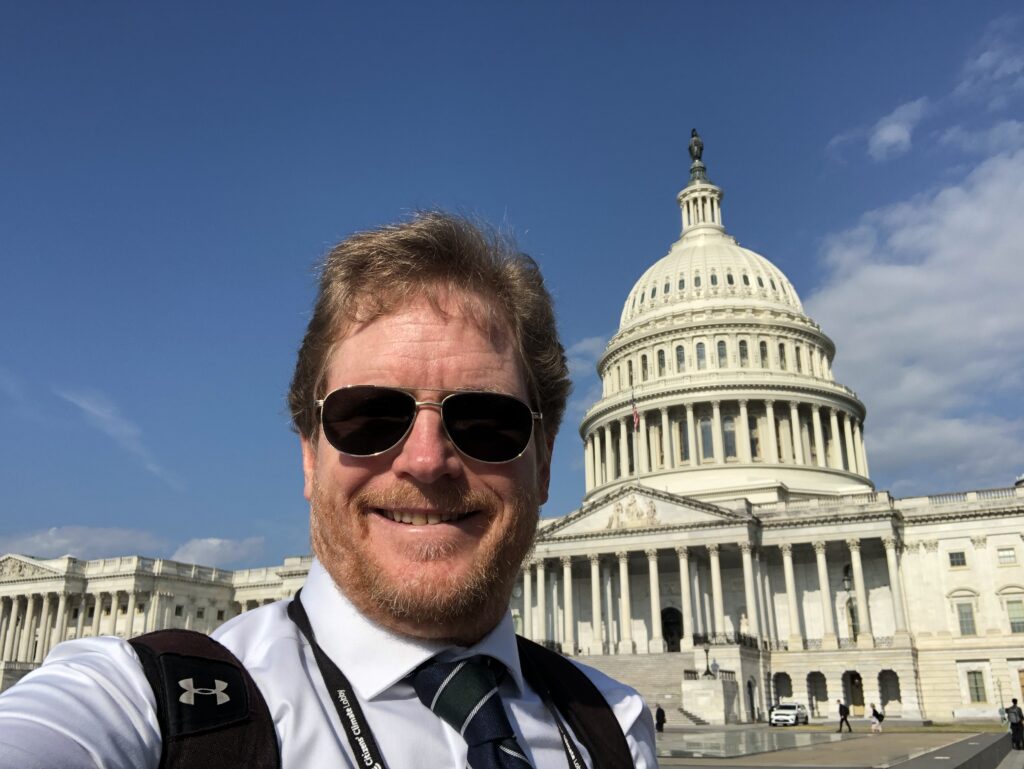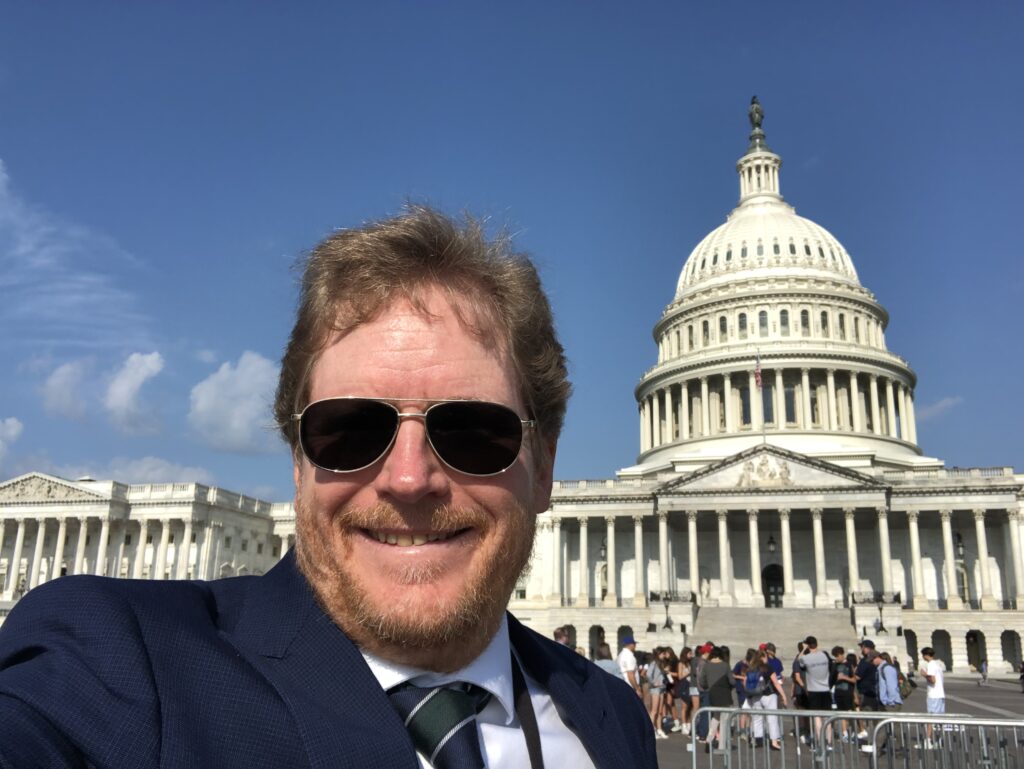
“It’s not enough that we do our best; sometimes we have to do what’s required.”
– Winston Churchill
As a climate organizer, one of my favorite actions is traveling to Washington D.C. to lobby Congressional Offices to urge them to pass effective climate policies. Since November 2015, I traveled eight times to Washington D.C. to attend Citizens’ Climate Lobby (CCL) conferences and lobby days on Capitol Hill. In 2015, I blogged about my first experience lobbying in Washington D.C. In 2016, I wrote about lobbying in Washington D.C. and Ottawa, Canada . Plus, I blogged about lobbying on Capitol Hill with CCL in 2017. That same year, I shared how climate Lobbying is very hard, but it is so rewarding. Indeed, it has been very meaningful to lobby at the U.S. Capitol because I once persuaded a member of Congress to co-sponsor a climate bill in 2020.
I got injured the first time after I lobbied as I returned from Washington D.C. for climate action, but I have no regrets. I love traveling to the U.S. capital, but it is a very long flight from Portland, Oregon. Washington D.C. is a very beautiful city, with similar weather as my hometown of St. Louis, Missouri. It can be quite humid and hot in the summer and frigid at times in the winter. The iconic monuments to Lincoln, Jefferson, Washington, the Vietnam Memorial, the White House, the Supreme Court, and the U.S. Capitol Building are all sacred sites to see. It is very convenient to get around the city with the Washington Metropolitan Area Transit Authority commuter rail system (or the Metro). The trains roar like a lion as they loudly enter the subway stations. They carry up to 8 passenger cars that seems to stretch for over a mile.
On the lobby day, I love walking out of the Metro Union Station to be greeted by the shiny white Capitol dome above the trees several blocks away. It is a hassle but a necessity to go through airport like security to get inside the Senate and House office buildings. Walking inside the Congressional office buildings, it is a fun and complicated maze to try to find the exact offices of Senators and Representatives to arrive at our CCL scheduled lobby meetings. Arriving inside the offices of the members of Congress, one is greeted by friendly staff and exquisite artwork, photography and mementos that represent that Congressional district or state.
The best part is the scheduled meeting with the Congressional staff or possibly even a member of Congress to urge them to support specific climate legislation. It feels very empowering as a citizen to petition them to support climate bills. At the same time, the Congressional staff often provides valuable information where the member of Congress stands on a particular bill. The staff or member of Congress can be very helpful on what information they need before supporting or co-sponsoring a bill, who they like to work with across the political aisle, and what’s happening in Congress that can help or impede getting a climate bill passed. It is very fascinating to hear what the staff or member of Congress has to say.
Many other things make lobbying Congressional Offices in Washington D.C. amazing. The shiny marble hallways and floors with people walking about and talking in quiet voices. The national media gathered at various spots to try to snag a quote from a U.S. Senator. Recently, I playfully posed in front of them for a second pretending like they were interviewing me for a story.
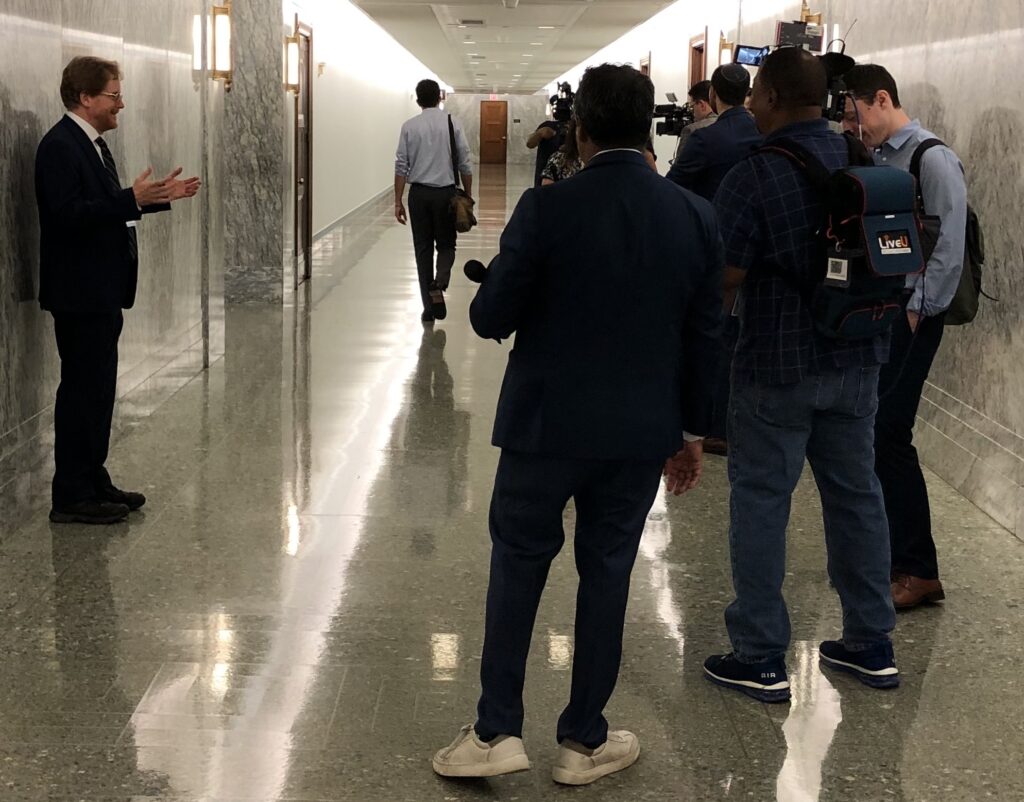
The Congressional cafeterias have an amazing variety of food for whatever you are in the mood to eat that day: pizza, sushi, tacos, spaghetti, hamburgers, garden salads, wraps, soups, ice cream, etc. You name it!
You never know who you are going to run into walking down the Congressional hallways. On my most recent visit on June 13, 2023, I said hello to U.S. Senators Ted Cruz of Texas and John Kennedy of Louisiana. In addition, many other groups are lobbying Congressional offices the same day as the CCL lobby days. I chatted with volunteers with the Susan G. Koman Foundation in a Congressional cafeteria as they lobbied Congress for funding to research to prevent and cure breast cancer the same day CCL was there. As you can tell, I love everything about lobbying the Congressional Offices for climate action in Washington D.C.
My disillusion with Citizens’ Climate Lobby in recent years
Sadly, with the 2020 COVID pandemic I was not able to travel to Washington D.C. for the last three and half years. During the pandemic, I participated in some Zoom lobby meetings with Congressional staff. That was enjoyable, but it was not same as traveling to Washington D.C. and the U.S. Capitol to lobby Congressional offices.
Since I last lobbied in Washington D.C. in November 2019, I became disillusioned with CCL. As I blogged about previously, it always felt like national staff in the organization and leaders in Oregon CCL kept me at arm’s length. They emphasize a core value of treating people with appreciation, gratitude, and respect. However, it never felt like the organization treated me that way.
By far, my lowest moment in my climate organizing, was in 2016. Then Vice President of CCL, Madeleine Para, did not want me to do my own fund raising to organize a speaking tour across Missouri to promote CCL and climate action. My friend and Missouri state CCL Coordinator, George Laur, organized a Missouri speaking tour for me in March 2017. It left a bad taste in my mouth though that Madeleine and CCL national did not want to support me for devoting myself to a tour across Missouri to promote them.
In October 2018, I organized a climate action speaking tour across Missouri. I spoke to over 200 students, faculty and alumni at my alma mater William Jewell College, just outside of Kansas City, Missouri. I then gave talks at Missouri University in Columbia, my alma mater Oakville High School, St. Louis University, and teaching a Climate Change 101 continuing education class at the Meramec campus of St. Louis Community College. It was a very successful tour with my presentations across Missouri. By giving these talks, I hoped it might inspire other climate organizers to speak to their alma mater colleges and high schools. I requested to write a blog on the CCL website to report on this Missouri tour, but CCL was not interested. They offered to feature me on their Citizens’ Climate Higher Education website, but not their main website.
In 2017, I decided that I really loved climate lobbying and wanted to a career doing this. I was very impressed at that time with Jay Butera, a volunteer with CCL from Gladwyne, PA. In 2016, after years of effort, “Jay was the concept-originator and driving force behind formation of the bipartisan Climate Solutions Caucus in the U.S. House of Representatives.” For several years, Jay served as CCL’s Senior Congressional Liaison in Washington, working to maintain a continuous year-round presence for CCL in the Halls of Congress. In January 2017, I invited Jay to be the guest speaker at the last St. Louis Climate Reality Meet-Up event I organized before moving to Portland, Oregon a week later. Over 80 people attended this event, packing the room at Schlafly’s Bottleworks in St. Louis.
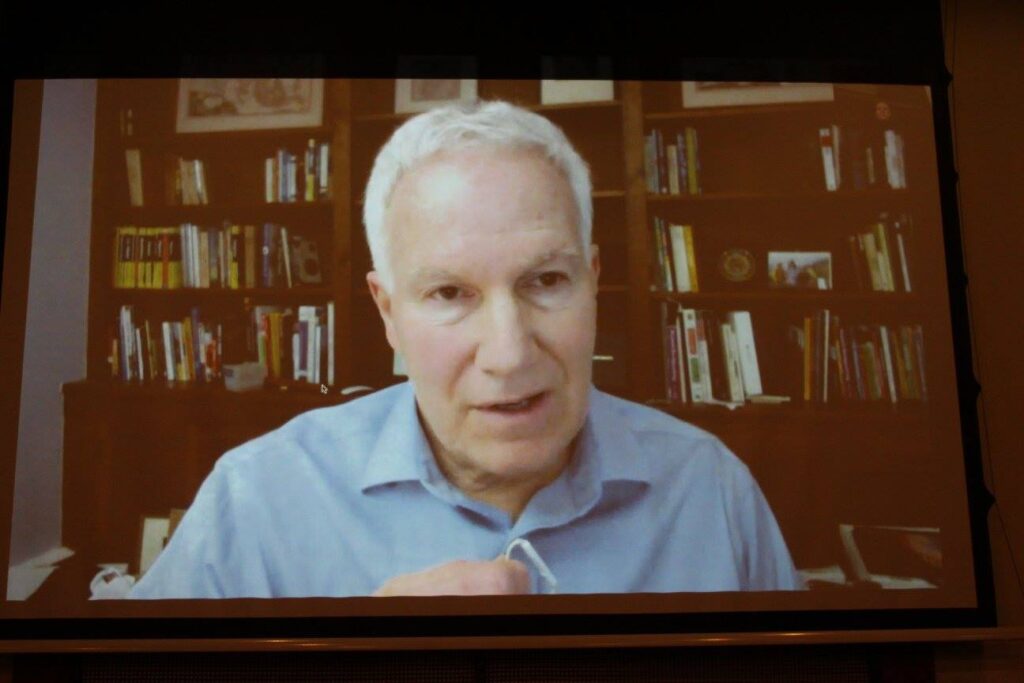
In April 2017, I emailed the Vice President of Government Affairs at CCL, Danny Richter, and Jay Butera to see if I could shadow Jay and learn how he lobbies in Washington, D.C. Both flatly turned me down. Their responses really stung. I felt like neither one of them wanted to advise me at all to be an even more effective climate lobbyist and make a career out of it.
Feeling like I frequently got the door slammed in my face by CCL hurt badly. However, I kept picking myself back up to try again. My last straw with CCL when I organized a state resolution in the Oregon Legislature in 2021 to urge members of Congress to support the federal bill, the Energy Innovation and Carbon Dividend Act (EICDA).
This Oregon resolution became known as became known as Senate Joint Memorial 5 or SJM 5.
It passed the Oregon Senate on April 7th by a vote of 23 to 5, with 6 Republican Senators, half of the Oregon GOP Senate caucus, joined all the Democratic Senators present to vote to support it. Unfortunately, SJM 5 fell short of receiving a floor vote in the Oregon House in June 2021. It was exciting was that 30 House members, including 7 Republicans, signed on to co-sponsor it. The Oregon House has 60 members. Half the chamber was SJM 5 co-sponsors.
The worst part of this defeat was Oregon CCL leadership becoming very angry when the OR House Democratic Leadership refused to give SJM 5 a floor vote. After I experienced two dreadful GOP walkouts that defeated the 2019 and 2020 cap and invest bills, I never believed SJM 5 would pass until I saw it with my own eyes. In June 2021, the Oregonian published an opinion editorial from Oregon CCL leadership, and I disagreed with the tone. Former Rep. Tiffiny Mitchell advised us not to publish it since it seemed to attack OR House Democratic Leadership.
After that happened, I lost nearly all respect for CCL and I stepped away from volunteering from the organization. I then focused my energy on my climate writings, volunteering for the Oregon League of Conservation Voters (OLCV) and canvassing for Democratic legislative candidates in 2022. CCL challenges its volunteers to ‘step out of their comfort zone’ because ‘that’s where the magic happens.’ However, whenever I tried to step out of my comfort zone to promote and organize for CCL, I felt like I only received pushback from the organization.
To this day, I still love CCL. They are the only environmental and climate organization that I know that truly strives to empower their volunteers to build positive relationships with elected officials, the media and their local community for climate action. I learned so much volunteering with them. At the same time, they have broken my heart at times and left me feeling demoralized as a climate organizer. I first wrote a blog about them in February 2013, Want to change the world? Be Persistent! If I could go back in time to when I wrote that blog or when I first became involved with CCL in May 2012, I would have lots of words of caution for myself.
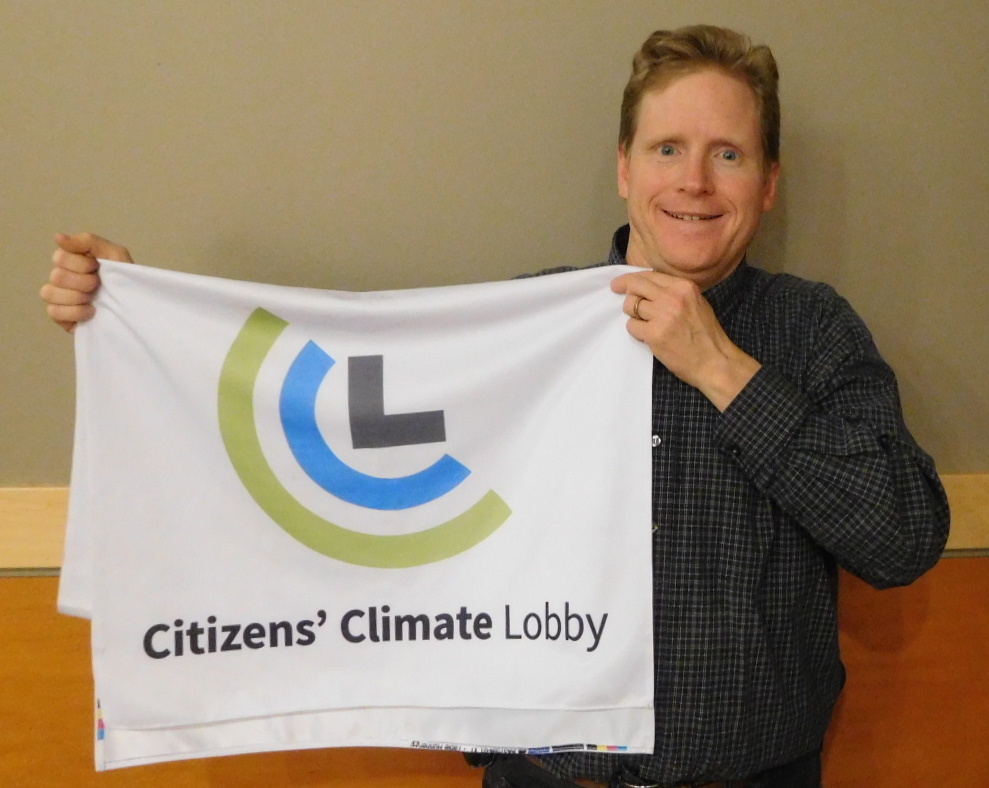
Deciding to attend the CCL Conference and Lobby Day in Washington D.C. in June 2023
In early 2023, CCL announced it would be lobbying for the first time in person in Washington D.C. since November 2019. This would be their first in-person conference and lobby day on Capitol Hill since before the COVID-19 pandemic. After my setbacks interacting with CCL, I was not sure if I wanted to attend.
In late April, I reached out to friends in the Washington D.C. are to see if I could stay with them. In my previous eight times that I attended CCL conferences and lobby days in Washington D.C, I stayed with friends in the D.C. metro area. If either of my friends indicated that I could stay with them, that would be a deciding factor if I would register and attend the conference. If those friends did not offer for me a chance to stay with them, I would not travel to Washington D.C. because I cannot afford the hotel rooms in the D.C. metro area.
On May 2nd, I heard from my friends Tom and Reena that I could stay with them. Sadly, that same day, I received the news that my car needed over $2000 in repairs. On May 18th, I started crafting an email to Reena to say that I could not afford to travel to stay with them. On the bright side, my wife felt bad seeing how much I had to pay to repair my car. Thus, she bought me a brand-new Mac Book Pro laptop because I desperately needed a new and faster laptop. To my relief, the final car repair bill turned out to be a little less expensive at $1650. May 21st was the final day to register, so I needed to decide to attend or not to attend quickly.
The final straw that pushed me to register to attend the CCL conference and lobby day was the CNN town hall with Donald Trump on May 10th. It upset me that CNN allowed this twice impeached, indicted, disgraced former president to say a lot of false information with very little real time fact checking. The day before, a New York jury found Trump liable for battery and defamation in the lawsuit filed by E. Jean Carroll. She claimed that Trump raped her in a Manhattan department store in the mid 1990s and the jury basically agreed. Trump used that townhall to call her a “wack job.” It was appalling that town hall audience laughed and clapped when Trump called her that name. Even worse, the audience cheered with approval when he lied about the 2020 Presidential election was stolen from him. It still seemed like our democracy was under severe threat from Donald Trump and this modern Trumpist movement.
Thus, I decided I was going to Washington D.C. to lobby for climate action to celebrate our democracy and stress the importance of climate action. Yes, I felt raw how CCL treated me over the years. However, my love for our democracy and passion for climate action was a higher priority for me than my misgivings about CCL. Thus, I bought my airline tickets and registered for the CCL conference and lobby day just a couple of days before the May 21st deadline. I really do try to live my life by the Winston Churchill quote:
“It’s not enough that we do our best; sometimes we have to do what’s required.”
Attending the CCL Conference in Washington D.C. in June 10-12, 2023
My flight arrived in Washington D.C. around 5:40 pm on Friday, June 9th. I told Tom and Reena that I would not be arriving at their house until sometime after 7 pm. In the previous days, Washington D.C, New York City, and much of the northeast U.S. coast experienced hazardous and smoky air due to wildfires in western Canada. I felt a sense of dread receiving that news.
In past years, my wife and I experienced very unhealthy air from western wildfires while living in Portland and Crater Lake National Park, Oregon. It was very dispiriting to be trapped indoors, especially during the 2020 pandemic, due to wildfire smoke causing awful air conditions. I would not wish those smoky conditions on my worst enemy. I had compassion for people living on the northeast coast experiencing this extremely poor air quality in the second week of June. I worried about experiencing those smoky conditions when I arrived in Washington D.C.
I was very fortunately the Canadian wildfire smoke had mostly dissipated when I arrived in Washington D.C. The weather was pleasant and sunny. I hopped on the Metro to head to Tom and Reena’s home in Tacoma Park, Maryland, which bordered Washington D.C.. The outdoor conditions were nice enough that I decided instead to get off the Metro at Union Station to walk a couple of blocks to the U.S. Capitol to see the building for the first time since November 2019.
The U.S. Capitol Building looked majestic and peaceful on that lovely late Friday afternoon. I loved seeing the exterior of this temple for democracy in all its glory. The building and the Capitol grounds looked very serene and relaxing. As a climate organizer, the U.S. Capitol area seemed like it was welcoming me back to do my first in-person lobbying there in three and a half years. A positive spirit was in the air as I took several “selfies” with my iPhone. A friendly person asked me if I wanted my picture taken. At the same time, it felt heavy and sad that January 6th took place there only a year and a half before. It was hard to believe that a very dangerous and unruly mob wanted to vandalize the building and hurt elected officials on the inside.
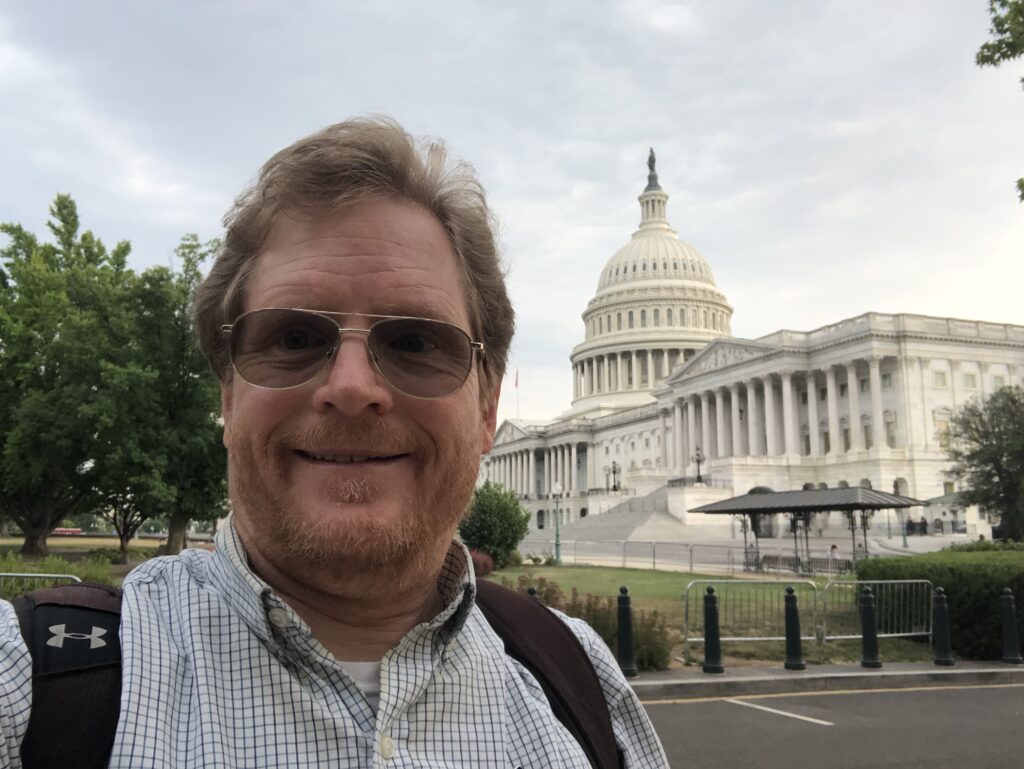
I then took the Metro to Takoma Park, Maryland to stay with Tom and Reena. They were happy to see me for the first time in three and a half years. They very generously had a comfortable guest room for me to stay. They were one block from a local food co-op where I could buy all my own groceries to make my own breakfasts while I stayed with them.
Late the next morning, I planned to attend the first sessions of the Citizens’ Climate Lobby conference. On the way there, I got off the Metro near the White House to walk by the building on Pennsylvania Avenue and view it from Lafayette Square. As always, the President’s Executive Mansion looked beautiful, a bright color in the summer afternoon sun. Seeing the building in person, looked different how it is seen on TV. It looked a bite like a southern slave plantation house in keeping to the style when it was first completed around 1800. The scene on Pennsylvania Avenue was lots of tourists admiring the building and taking pictures. A religious man shouted into a megaphone deriding gay pride as a sin, since June is Gay Pride month. Nearly everyone there ignored him and his message as they enjoyed the scene of seeing the White House.
I then took the Metro to the first day of the CCL conference at the Omni Shoreham Hotel where author and environmentalist Bill McKibben spoke via video from his home in Vermont for the CCL monthly conference call. Bill promoted his new group, Third Act, to build “a community of Americans over the age of sixty determined to change the world for the better.” The goal of Third Act is to use the resources and energy of people over 60 years old to “use our life experience, skills and resources to build better tomorrow” in areas such as divesting large banks from fossil fuel investments, safeguarding our democracy, and powering up communities with clean energy. In addition, McKibben spoke in favor of CCL’s top priority for reforming the permitting process to speed up the pace to build new clean energy projects.
After Bill McKibben’s presentation, I enjoyed attending the CCL breakout session for the En-ROADS climate Workshop. For years, I found the En-ROADS climate solutions simulator to be an excellent tool to model the various solutions needed to reduce the climate crisis. I enjoyed the Saturday and Sunday sessions of the CCL Conference to prepare us to lobby Congressional Offices at the U.S. Capitol on Tuesday, June 13th. It was invigorating for me to see friends from across the U.S. who volunteer and work for CCL that I had not seen in three and a half years.
Lobbying Senator Ron Wyden’s D.C. office on permitting reform on June 13, 2023.
Over 850 CCL volunteers registered to lobby Congressional offices on the CCL Lobby Day of Tuesday, June 13th. As with all previous June CCL lobby days, all the volunteers lined up on the steps of the Capitol at 8:15 am for a large group photo. We then went our separate ways to our scheduled lobby meetings.
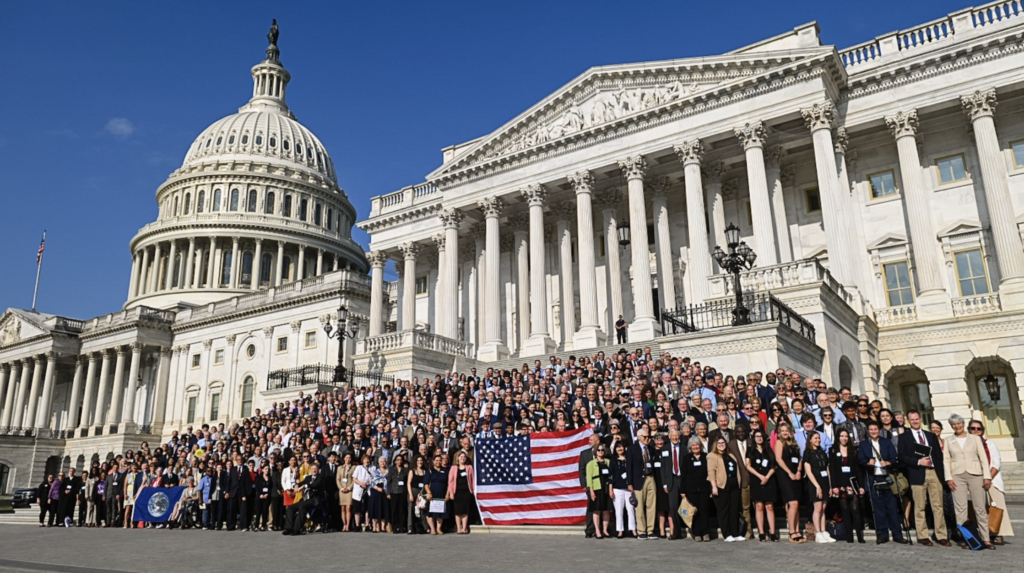
I had three scheduled lobby meetings that day with the staffs of Senator Ron Wyden, Representative Earl Blumenauer, and Representative Andrea Salinas, who are all members of Congress from Oregon. My first lobby meeting was not scheduled until 10 am, so I had time to call my wife Tanya, plus my mom and dad to let them know I was in front of the U.S. Capitol Building getting ready to lobby Congressional offices that day.
My first scheduled lobby meeting was a 10 am lobby meeting with staff of Senator Ron Wyden. Ten of us Oregon CCL volunteers were scheduled to attend this meeting. All of the roles for this meeting, such as appreciator, time monitor, notetaker, asker, follow-up, and listener, were divided up at a planning meeting on Friday, June 10th. I could not attend that meeting since I was flying from Portland to Washington D.C. that day. From that meeting, the remaining role assigned to me was the photographer. My task would be to make sure that we took of picture of all of us CCL volunteers by or in Senator Wyden’s Office, plus the staff member if they were willing to be in the group photo with us. At the lobby meeting, I made sure we got the group photo.
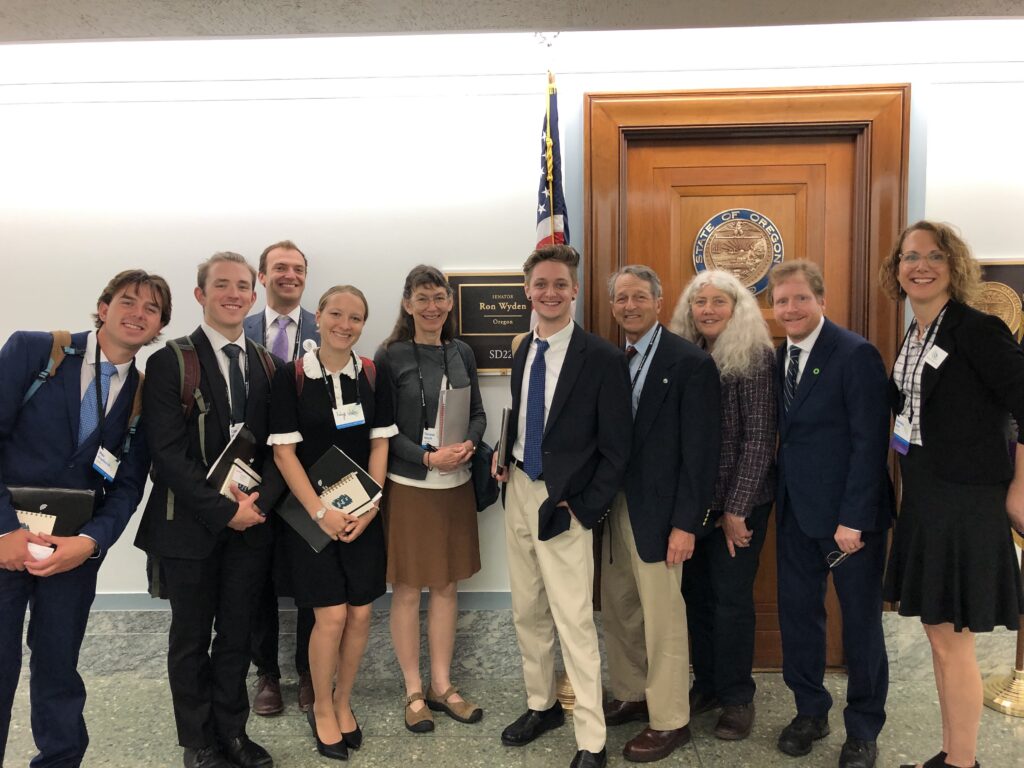
On Sunday afternoon, June 11th, Tamara Staton, Education and Resilience Coordinator for CCL, announced that that she had to back out of our Tuesday Wyden lobbying meeting. The leader of this meeting, Teresa Welch, asked for someone to step into Tamara’s role for this meeting to share with Senator Ron Wyden’s staff CCL’s position on permitting reform. I immediately jumped at the opportunity. I felt like I absorbed CCL’s detailed reasoning why permitting reform was a top priority during the CCL Conference that happened between Saturday, June 10th to Monday, June 12th. From what I learned about performing reform at the CCL conference, I was eager to share understanding of this issue in the lobby meetings.
When I texted Teresa on Sunday offering to explain CCL’s stance on permitting reform during the Wyden lobby on Tuesday, Teresa responded “Are you OK with doing that whole job (introduce the topic, share CCL’s perspective, and ask a question to start the conversation)?”
I texted back that I was. I then wrote out CCL’s position on permitting reform, which is:
CCL’s position that clean energy permitting reform is a top priority for us:
• We can’t implement the IRA without it. Over 80% of the potential emissions reductions delivered by IRA in 2030 are lost if transmission expansion is constrained.
• We can’t reduce US greenhouse gas emissions by 50% by 2030 without it. It’s a key policy action if the US is going to meet the 2015 COP Paris commitments.
• More than 92% of new energy projects currently awaiting permits are solar and wind, and just 7.5% are natural gas. We need permitting reform to get the good projects implemented more quickly.
• It takes an average of 4.5 years for federal agencies just to complete environmental impact statements for major energy projects. That’s way too slow! These are important assessments, but we need speed up the pace with which we build new clean energy projects.
• We want a bill that will be:
– bipartisan
– improves community engagement.
– makes federal agencies more efficient,
– allows transmission lines to be permitted and built much faster.
We want a permitting reform bill that allows for the good clean energy projects to be approved more quickly and the bad ones to be rejected faster.
Basically, we want a permitting reform bill that speeds up approval of clean energy projects with community engagement.
In addition, I shared with Senator’s Wyden’s staff a printed graph from CCL that shows the U.S. is projected to have a 28% decrease in greenhouse gas emissions by 2030. However, if we enact permit reform, we could get to a 40% decrease in greenhouse gas emissions by 2030. With permitting reform, it gets the U.S. a giant step closer to its 2015 Paris commitment of a 50% reduction of greenhouse gas emissions below the 2005 level by 2030.
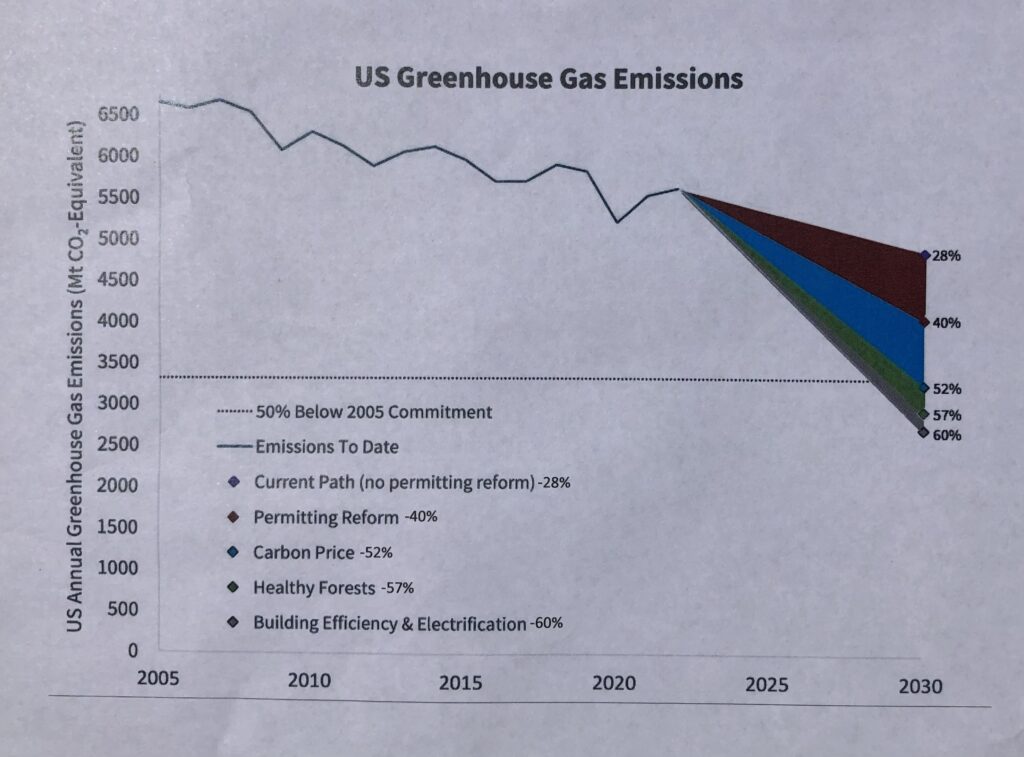
When I was finished explaining all of this, I asked Senator Wyden’s legislative aide what the Senator’s position was on permitting reform. The aide’s response was very positive. I can’t say anything beyond that because the CCL meetings with Congressional staff and members of Congress is confidential. Overall, all the Oregon CCL volunteers and I in the meeting with Senator Wyden’s staff felt like we in near agreement about permitting reform.
Meeting with staff of Rep. Earl Blumenauer about CCL’s carbon pricing bill
For our noon meeting with staff of Rep. Earl Blumenauer, the meeting leader, Walt Mintkeski, asked me to do the brief asks at the end of the meeting. Specifically, I would be asking Congressman Blumenauer to support permitting reform. Even more, we were asking him to support our carbon pricing bill, The Energy Innovation and Carbon Dividend Act (EICDA) when it is re-introduced soon in the U.S. House of Representatives.
The EIDCA was introduced in the two previous Congressional sessions in 2019 and 2021. In the previous Congressional session (2021-2022), the EICDA reached 95 House co-sponsors. I strongly support their advocacy for a price on carbon such as the EICDA bill. This policy puts a steadily rising fee on carbon at the source, such as the oil well, methane well, coal mine, or fossil fuel imports at the U.S. border.
The fee starts at $15 per metric ton of greenhouse gas emissions and increases by $10 or $15 each year, depending upon future emissions. The revenue from the fee is then returned to American households in a monthly dividend check. It is one of the best policies to protect American businesses while holding international polluters accountable with a carbon border adjustment mechanism (CBAM).
The EICDA targets 90 percent emission reductions by 2050 compared to 2016 levels. The United Nation’s Intergovernmental Panel on Climate Change (the IPCC) urges all nations of the world, especially the U.S, to reduce its greenhouse gas emissions to net zero by 2050 to avoid possible catastrophic consequences from climate change.
In the graph on U.S. Greenhouse Gas Emissions from CCL that I showed above in the previous section, a carbon price is a vital tool to reduce greenhouse gas (GHG) emissions. Implementing effective permitting reform, plus a carbon price, help the U.S. reduce its GHG emissions by 52% by 2030. As I mentioned previously, the U.S. has a 2015 Paris commitment of a 50% reduction of greenhouse gas emissions below the 2005 level by 2030. Permitting reform, plus a carbon price, helps the U.S. exceed its 2030 goal to reduce GHG emissions.
The United States and Australia are the only developed economies without a nationwide carbon price in place. The European Union, the largest foreign market available to U.S. producers, will begin implementation of a CBAM on imports (including American exports to the E.U.) this year based on its existing carbon price. Thus, a carbon fee and dividend with a CBAM, such as with the EIDCA, can help the U.S. reduce its harmful greenhouse gas pollution that causes climate change while helping make American products more competitive in the E.U.
Climate change is a high priority for Congressman Earl Blumenauer. In past years, he introduced his own carbon pricing bills. In our previous lobby meetings with Rep. Blumenauer and his staff, he has indicated that he would vote for the EICDA on the House floor if it came up for a vote. However, with his concerns about environmental justice, he resisted co-sponsoring the EICDA. On our June 13th lobby meeting, we asked his staff to pass along to Rep. Blumenauer that the EICDA will most likely be introduced soon. We asked that he please consider voting for it if it came up for a floor vote in the U.S. House, like he indicated in the past that he would do.
Like the meeting I attended with Senator Ron Wyden’s staff, we felt like we had a positive exchange of information with the staff of Congressman Earl Blumenauer.
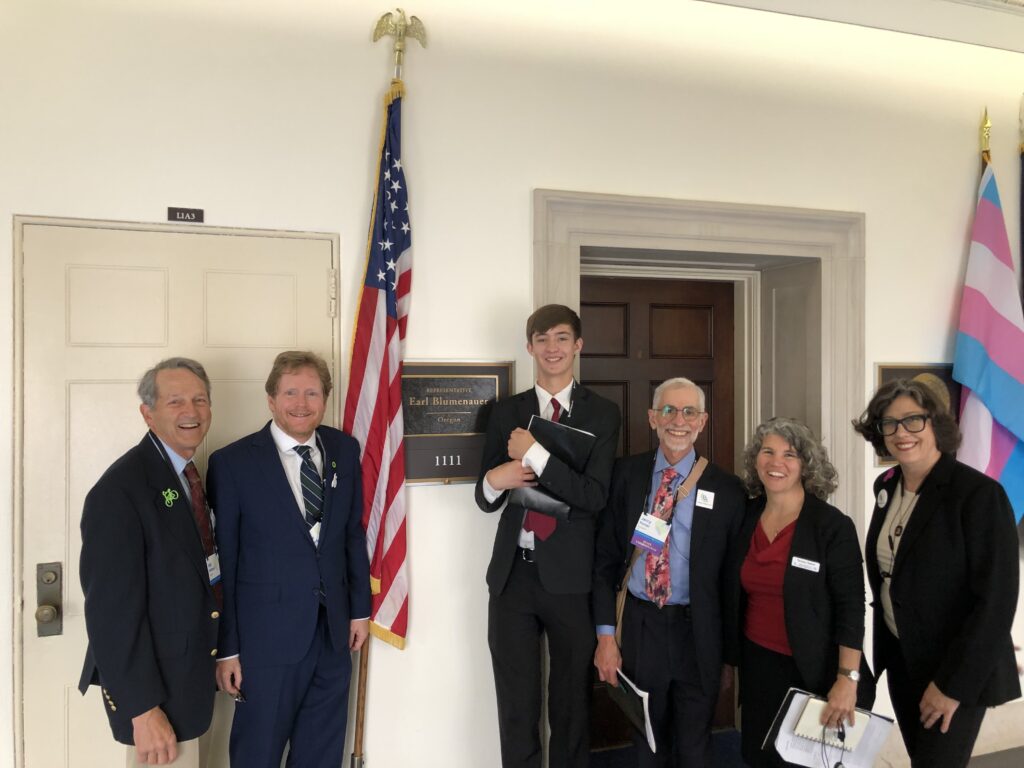
Briefly Chatting in the Halls of Congress with Rep. Andrea Salinas about carbon pricing
After my meetings with staff of Senator Ron Wyden and Rep. Earl Blumenauer, I had over two hours before our 2:15 meeting with staff of Rep. Andrea Salinas. My friend and fellow CCL volunteer, Walt Mintkeski, who led the Rep. Blumenauer meeting and would be leading the Rep. Salinas meeting, decided that we would hang out together until the Rep. Salinas meeting.
Walt informed me that our meeting plans for the Rep. Salinas meeting had changed. Originally, we were scheduled to meet with her office staff for 30 minutes. However, halfway in this meeting, the legislative aide would then walk us to the door of the nearby committee room, where we would have a brief chat with Rep. Salinas as she came out of her committee hearing.
Unfortunately, the committee meeting time had changed the day before. The legislative staff then informed Walt that the brief meeting with Rep. Salinas was cancelled. We felt a little disappointed since we hoped to say hello to Congresswoman Salinas. At the same time, we totally understood because the schedules of members of Congress change quickly. When that happens, face to face meetings with the Senator or Representative then gets cancelled.
As Walt and I walked towards one of the Congressional cafeterias, Tamara Staton, a staff person for CCL, joined us. She also was scheduled to be at the 2:15 pm meeting with staff of Rep. Salinas. As Walt, Tamara, and I waited for an elevator to go to a Congressional cafeteria around 12:48 pm, I noticed Rep. Salinas walk right by us. I said to Walt: “That’s Andrea Salinas!”
Walt is in his mid 70s, but he bolted after her like a kid running on a racetrack. I then ran to catch up to both of them in a quick instant.
Walt said hello to Rep. Salinas and she quickly remembered Walt and me. Walt mentioned that we were supposed to have a brief chat with her at 2:30 pm, but that was cancelled. Rep. Salinas confirmed that. Walt then asked if we could chat with her while she was briskly walking to her office. Rep. Salinas welcomed that idea and seemed very happy for us to walk with her.
I lobbied in Washington D.C. eight previous times. However, this was my first time directly lobbying a member of Congress while they were very quickly walking to their next scheduled event. Walt brought up permitting reform. She had interesting but confidential thoughts on that.
I was very excited to chat with her in person. I thanked her for being one of the first Oregon Legislators to endorse the EICDA in October 2020. I then thanked her for agreeing to be one of the first co-sponsors Senate Joint Memorial 5 (SJM 5) in the Oregon Legislature when it was first taking shape in December 2020. SJM 5 urged Congress to pass the Energy Innovation & Dividend Act. She was very supportive of all my climate organizing in Oregon in 2020 and 2021. Thus, this was a dream come true for me to talk with her directly on Capitol Hill. When I asked if she would support the reintroduction of the EICDA in this Congress, her response was positive. However, she said she wants to see the bill first.
She was then nearly at her office. I wanted to give her time and space to go to her next scheduled commitment. In the rush of everything happening, I asked if we could get a picture with her. She happily obliged to get a selfie photo on my phone with Walt, Tamara, me, and her.
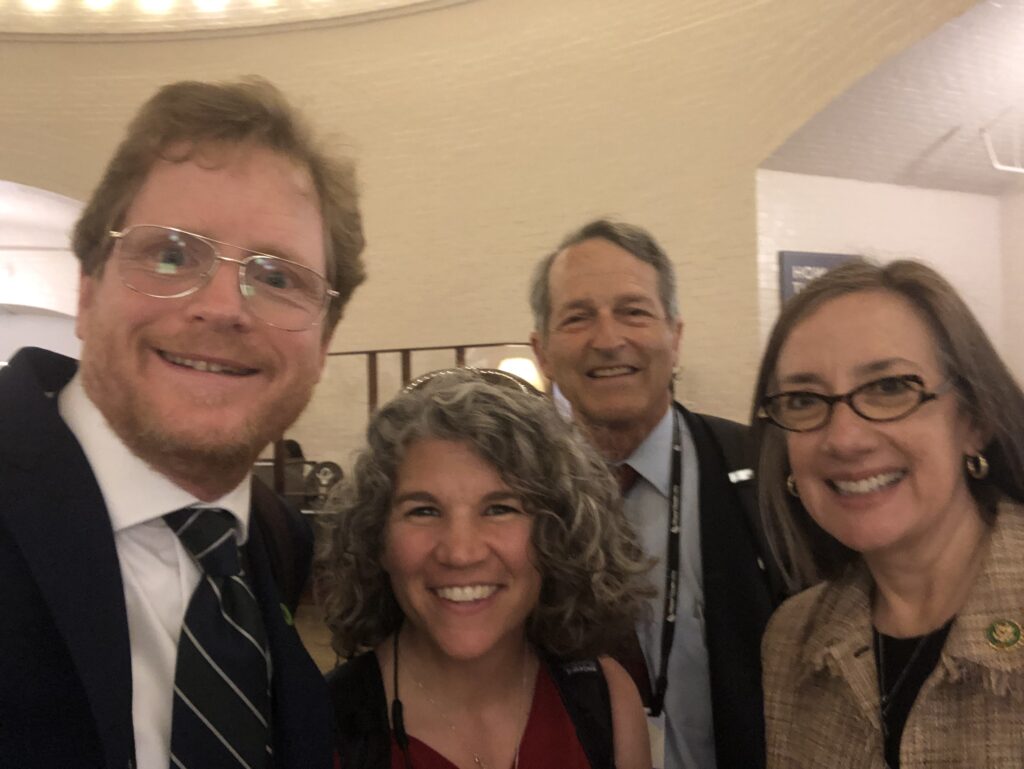
It was a sublime and exhausting experience to briskly walk to directly engage with her. She explained to us the political atmosphere in Congress. She had good insights on what was happening in Congress. At the same time, it frustrated me because I could not hear her well with the background noise. The acoustics of the Congressional hallways were terrible with lots of other people walking by and the sounds bouncing off the marble floors and hallways. Overall, I was very thrilled for a chance to chat with her and directly ask her to support climate legislation.
We then had over an hour to debrief from that experience and then get ready for our 2:15 pm meeting with staff of Rep. Andrea Salinas. Unlike the hallway frantic chat with Rep. Salinas an hour earlier, it felt much more relaxing to be sitting in her office exchanging information with her staff about permitting reform, carbon pricing, and other climate bills that CCL supported.
Final thoughts
That evening, I enjoyed attended the CCL reception at the Omni Shoreham that evening to see Congressman Scott Peters from California speak. It was great to connect with friends that I got to know from over the years in CCL and scarf down some free appetizers at the event. I then took the Metro back to Takoma Park to briefly visit with my hosts Tom and Reena before they went to bed. I flew back from Washington D.C. to Portland, Oregon the next day.
After feeling burned over the years with my involvement with CCL, I feel rather leery to be involved with them again. I do really love lobbying in Washington D.C and possibly attending a future CCL conference there. As a climate organizer, I am not sure what the future holds for me. I hope to find a way to successfully urge Rep. Andrea Salinas to co-sponsor the EICDA if it is introduced soon, but we shall see. I know for sure that I will find some way to feel productive and useful in the climate movement, whether I am involved with CCL or not.
